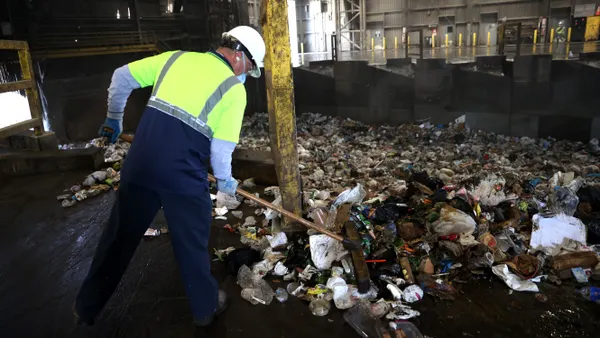Dive Brief:
- The Massachusetts Department of Environmental Protection (DEP) reports that capacity constraints at area material recovery facilities have begun to improve, and only three disposal ban waivers remain active. Greg Cooper, DEP's director of business compliance and recycling, called it "one of those perfect storms" during a Jan. 25 Solid Waste Advisory Committee (SWAC) meeting — a combination of China's scrap import policies, extreme winter weather, the usual high holiday volumes and a facility fire.
- DEP officials are touring area facilities for more information and being proactive in their response. This effort includes new "Recycling IQ Kit" contamination education grants of up to $40,000, a potential expansion of the state's recycling business development grant program and promotion of existing MRF investment loans.
- DEP did warn that the expected March closure of the Ardagh Group's glass recycling facility in Milford, MA could cause disruptions. Cooper said Ardagh has been taking a "significant amount" of glass, mainly bottles from redemption programs. Conversations are currently underway with Strategic Materials about helping fill the gap and a webinar on aggregate options is expected in the coming months.
Dive Insight:
Massachusetts has seemingly experienced more market challenges than some of its New England counterparts. The extenuating circumstances described at the SWAC meeting — including a recent blizzard that shut down port operations in Boston Harbor for multiple days — help explain why the state appeared to be faring worse than others in the area, such as Maine. Another factor to consider is that not every state has disposal bans which would require waivers for disposal.
The DEP began issuing waivers in November — mainly for service providers that were encountering MRFs with maxed out capacity due to slower processing speeds — to meet new contamination standards. Since Waste Dive last reported on the waivers in early January, new ones have been issued to Waste Management, Republic Services, Graham Waste Services and FM Services.
All of these waivers were for short periods of time and relatively small amounts of material. The DEP has issued 30 waivers to date, and is still calculating how many tons of single-stream material were actually sent to landfills or waste-to-energy facilities as a result. Future waivers would be required for any glass disposal related to Ardagh's closure, but officials hope to avert that by pushing beneficial use options.
As in other states, Massachusetts recyclers are said to be finding new markets both domestically and abroad. That doesn't mean they're getting great prices or not struggling to meet new contamination standards. It just means that the situation hasn't deteriorated to the point of programs being suspended like elsewhere. By helping more municipalities with education, using a system that has served as a model for The Recycling Partnership, DEP also hopes to see more capacity freed up by removing contaminants from the system.
With the usual February volume drop expected, and no imminent weather disruptions forecast, the agency is now cautiously optimistic.
"The material's continuing to move and in that sense I think that’s a positive thing. The MRFs are largely keeping up with what's coming in the door at this point in time," John Fischer, DEP's chief of commercial waste reduction and waste planning, told Waste Dive. "If it were National Sword alone, I don't think it would have been so bad."












